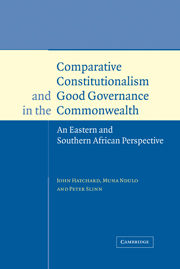 Comparative Constitutionalism and Good Governance in the Commonwealth
Comparative Constitutionalism and Good Governance in the Commonwealth Published online by Cambridge University Press: 23 June 2009
There may come a time in the life of a nation when a situation arises that seriously threatens its security or stability. In response, a government may legitimately declare a state of emergency and make emergency regulations designed to counter the danger. Article 4 of the International Covenant on Civil and Political Rights (ICCPR) recognises that ‘in time of public emergency which threatens the life of the nation’ a state may take measures derogating from its obligations under the Covenant. The real concern arises from the potential abuse of emergency powers: for example, where an unscrupulous government declares a state of emergency in order to maintain itself in power, then suspends or abrogates key constitutional provisions and effectively rules by decree, for an indefinite period. This is a scenario that is aptly called the ‘permanence of the temporary’ and calls for the development of effective constitutional safeguards against such abuse of power. This issue is examined in the first part of the chapter. A frequent companion of a state of emergency is the use of preventive detention and this area is considered in the second part of the chapter.
States of emergency
During the colonial period, states of emergency were imposed in Kenya, Northern Rhodesia, Southern Rhodesia and Nyasaland as efforts were made to retain political and economic control and to stem the tide of African nationalism.
To save this book to your Kindle, first ensure no-reply@cambridge.org is added to your Approved Personal Document E-mail List under your Personal Document Settings on the Manage Your Content and Devices page of your Amazon account. Then enter the ‘name’ part of your Kindle email address below. Find out more about saving to your Kindle.
Note you can select to save to either the @free.kindle.com or @kindle.com variations. ‘@free.kindle.com’ emails are free but can only be saved to your device when it is connected to wi-fi. ‘@kindle.com’ emails can be delivered even when you are not connected to wi-fi, but note that service fees apply.
Find out more about the Kindle Personal Document Service.
To save content items to your account, please confirm that you agree to abide by our usage policies. If this is the first time you use this feature, you will be asked to authorise Cambridge Core to connect with your account. Find out more about saving content to Dropbox.
To save content items to your account, please confirm that you agree to abide by our usage policies. If this is the first time you use this feature, you will be asked to authorise Cambridge Core to connect with your account. Find out more about saving content to Google Drive.